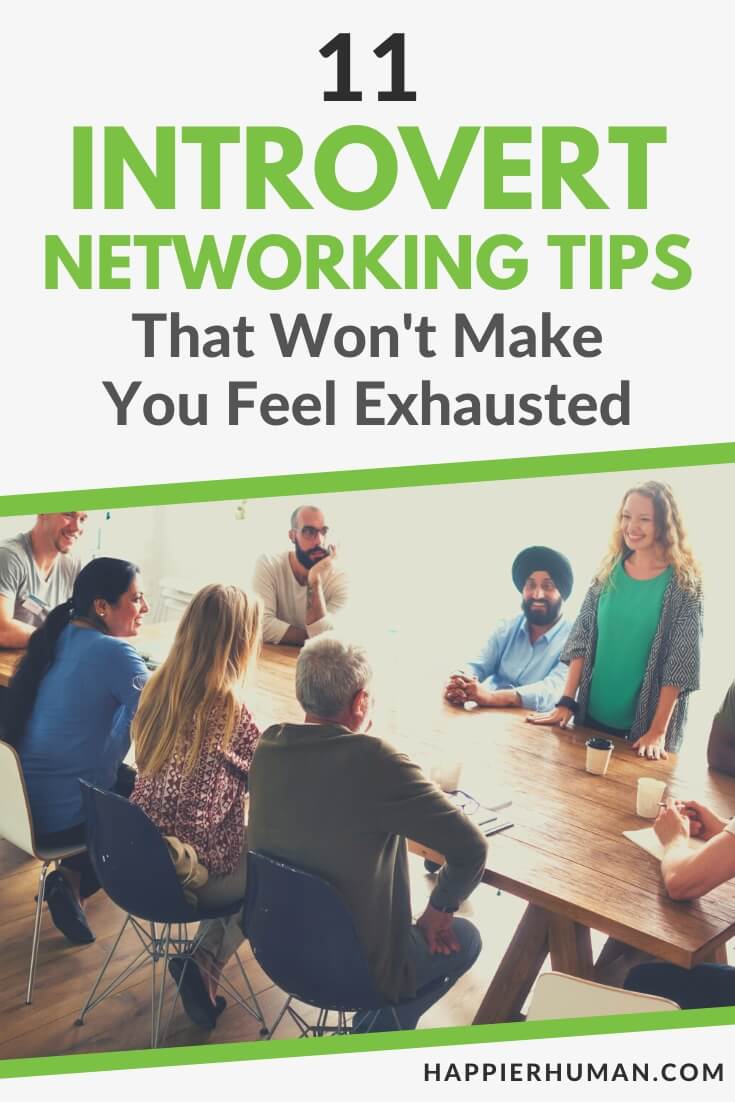Networking is stressful, and it’s doubly more so when you are an introvert. I know how much social events drains me and how much I despise being forced to mix and mingle at a networking event (especially if it’s compulsory).
Can you relate? Do you dread networking as much as you do when someone calls you (and they could actually have sent a text message or an email instead)?
The good news is that you can learn to network for success AND not feel utterly exhausted afterward. But you need to be smart about it.
I’ve got a comprehensive guide with the best introvert networking tips so you still have energy left after you’ve been out and about and making new contacts.
What Is Networking?
Networking, in the professional sense, is a process whereby you interact with other people to make connections, build relationships, and exchange information and ideas so you can increase your network or pool of social and/or professional contacts.
Networking takes place in various forms and at different places. You can network one-on-one or in a group setting.
You can also network at a social event you need to attend, at a Zoom meeting for like-minded individuals, and even on social platforms like LinkedIn, which is specifically aimed at professionals and networking.
Some networking events you may need to attend during your life include:
Why Is Networking Important?
Networking is essential for various reasons; it:
Why Do Introverts Have Trouble Networking?
Networking sure sounds like it’s amazing. I mean, you can help other professionals and maybe someone will open a door somewhere for you. But …
If you’re an introvert like me, there are few other things you despise more than networking. So why doesn’t networking come naturally to us introverts?
Introverts are inward-looking, and we feel energized when we spend time by ourselves. Because of nature and nurture, our brains work slightly differently (compared to our extrovert cousins), and we easily feel overwhelmed when we’re around groups of people or attending other social events – like a networking one.

You probably dread going to a networking event because you know how draining it is to be around so many people, and it feels so forced and uncomfortable. Maybe you even feel a pang of envy at those extroverts or ambiverts who seem to be pros at connecting with strangers and making small talk.
But considering the benefits there are in cultivating networking skills in your professional life, it is something you should learn to be good at, or at least, cope with on a better level, especially if you aren’t an extroverted introvert.
11 Tips for Introverts to Not Feel Exhausted When Networking
A popular phrase to capture the benefits of networking is “your network equals your net worth.” So, if you want to capitalize on that, follow these best tips so you, my introverted friend, don’t feel so completely exhausted after networking.
1. Create Achievable Goals
Step one for not feeling done-for when you have to attend a networking event is to set up achievable goals. With your goals in mind, the event won’t seem so daunting as you’ll lessen stress and pressure.
You may think that you need to stay from start to finish or shake hands with everyone (and their mom) at the event, but you don’t.
You need to do what’s right for you (and that doesn't mean giving networking a miss). The best way to set achievable networking goals is to use the SMART goals and ask yourself these questions:
2. Prepare Beforehand
Before you go to networking events, it’s essential to try and reduce any anxiety and other negative feelings. And preparing is one sure way to beat the networking blues as you’ll feel mentally and physically more at ease.
So how can you prepare when you need to go out and network?
You can prepare in these ways:
3. Learn to Be an Even Better Listener
Introverts are naturally and usually great listeners, and that’s why they make such excellent friends. But when you have to network, further hone your listening skills.
You are probably thinking now that you should rather work on your conversation skills to be good at networking, but mostly, you just need to be a great – active – listener.
As a mindful and active listener, you aren’t focused on preparing your response. You listen to the person’s words and read their body language so you can engage without talking. Nod at the right moments and maintain eye contact.
Active listening will make networking more enjoyable as the conversation will flow more naturally.
4. Work on Your Body Language, and Smile!
Not all introverts are shy or socially awkward. Some of us feel a bit more comfortable around people, and we do okay socially.
But if you fall in the camp where it’s awkward to mingle, it’s time to work on your body language.

If you’re closed off with arms crossed over your torso and you have resting B* face, no one will want to approach you and they may even walk away when they see you approaching.
Rather adopt open body language and smile when you meet someone’s eyes. Be approachable so others can approach you and you them.
5. Focus on Quality
A networking event isn’t a contest where the prize is to chat with everyone. You won’t even remember half the conversations or people you’ve met, so what’s the point?
When an introvert networks, it’s best to focus on quality rather than quantity. At any networking event, there’s no need to try and mingle with every one of the attendees – you’ll only exhaust yourself and need like three months to recharge your social battery.
Thus, you need to find quality connections. And that may be as simple as one great connection, which equates to a successful event.
6. Take a Trusted Friend with You
Bring a trusted friend or colleague with you to make the event a lot less intimidating and to give you a safety net. Of course, you shouldn’t spend all night chatting to your friend and monopolizing their time. You are at the event to network, so go out there and network.
The benefit of having a friend (aka wing person) with you is that you’ll relax more and they can introduce you to people, which helps break down barriers.
7. Dress Comfortably
There is nothing worse than feeling uncomfortable in a situation and then feeling physically uncomfortable too because of how you chose to dress. The high heels or restricting ties can be a bit much.
Say goodbye to feeling (extra) exhausted when you network by making sure you are dressed as comfortably as is professional and appropriate. Look good, but feel good too.
Ditch the tie and ensure your button-down shirt is clean, crisp, and comfy, or swap the heels for wedges or stylish sandals with a short heel.
8. Have Fun and Focus on Building Relationships
If you stop focusing on the fact that it’s a networking event and attend with the intent to build relationships and have fun, you’ll feel a whole lot better about everything.
What I mean here is that when I attend networking events (okay, yes, it’s once in a blue moon), I don’t worry about “making the sale” anymore. I know that this puts way too much pressure on connecting with the right people, and the conversation just feels fake and forced.
Instead, I nowadays focus on fostering the relationship with the connections I make at the networking event. You can only benefit from networking when you focus on the relationship, and that’s where it starts. Plus, I know that us introverts are great at working on quality and meaningful relationships.
Just help those you can, actively listen, and build the “friendship.”
9. Ask Loads of Questions
I know I said earlier that you should focus on improving your listening skills rather than your conversational skills, but when you have lots of questions to ask, the focus isn’t on you. It’s on the other person who replies.
So, to avoid feeling exhausted at and/or after a networking event, prepare questions you can ask your fellow networkers. And people love talking about themselves, so chances are, your fellow networker will be all too happy sharing about their life, work, and more.
As you listen, you can find common ground and then also participate in the conversation by sharing something about yourself and adding your insights.
A pro tip is to not just ask the usual boring questions like “what’s your job or where do you work?” Dive deeper (especially if you’ve done some research) and ask more insightful questions like “I read that company X is raising an IPO. I’d love to hear more about your strategy and where you want your company to be in five years’ time.”
10. Know Your Limit
Quitting isn’t a bad thing. In fact, winners know when to quit and when to try again. So be a winner and know your limit – how much you can handle at the networking event – so you avoid feeling too exhausted.
Chances are you have to go home to your family (so that’s more people and social interaction), and it’s likely that you have to work the next day (so even more people).

If you can handle an hour or two at the event, set an alarm on your phone or have a friend call you to remind you to say goodbye and take your leave. At least there’s no rule that says you should be the first and last person at the event!
11. Remember to Recharge
One final tip I have when you have to network and be around large groups of strangers is that you need to make time for yourself. I like to hide in the bathroom for five to ten minutes if I need a breather while at the event.
However, the best time I recharge is when I’m at home after networking. Think of this as your reward for going out and reaping the benefits of fostering professional connections so you can help someone and they can hopefully help you too in your career.
When I get home after networking, I want peace and quiet, so I like to soak in the bath with a bottle of red and soothing music or meditation. Remember to take care of yourself!
Final Thoughts on Introvert Networking
Introvert networking is usually exhausting and can lead to introvert burnout, but you don’t have to feel that way.
Often, you don’t have a choice in attending a networking event, so rather than dreading it, follow my top tips so you can make the most of connecting and building professional relationships while not feeling completely drained.
Remember to set achievable goals, prepare before the event, take a friend or colleague with you, dress comfortably, smile and show that you are ready to engage with your body language, and actively listen.
Do you maybe believe that there isn’t strength in being an introvert? Well, you’d be surprised to learn that being an introvert is a good thing. So why don’t you check out our guide on introvert strengths to help you in life (and when you need to network)?
And if you're looking for more resources for introverts, be sure to check out these blog posts:
- Can an Introvert Become an Extrovert? 7 Reasons It’s NOT Possible
- 17 Obvious Signs You’re an Extreme Introvert
- 7 Warning Signs You’re Experiencing Introvert Burnout or Exhaustion
Finally, if you want to identify YOUR personality type, then take one of these 11 personality tests to better understand what makes you tick.


